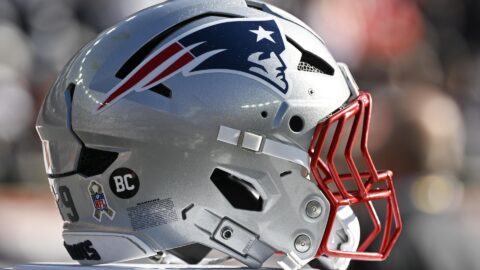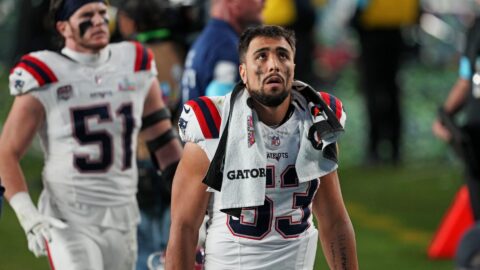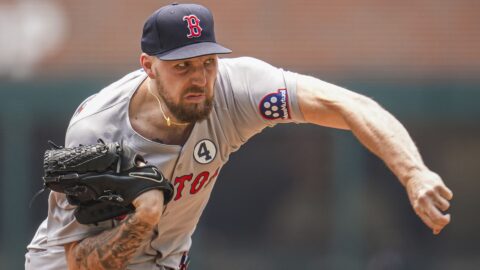Just as NHL general managers never really get a summer break, free time
is few and far between for NHL personnel and also for the man that is
entrusted with preserving the well being of the players.
Newton, Mass.
native Paul Kelly was introduced as executive director of the
National Hockey League Players’ Association (NHLPA) on Oct. 24, 2007
and admittedly and happily told NESN.com he hasn’t had or really taken
many breaks since.
“It never really stops but I love it and that’s why I’m doing this,”
Kelly said before embarking on a recent vacation. “I took this job
knowing how involved I’d need to be and that’s really the only way I
see it working. It has to be your passion.”
Kelly is constantly in touch with his players, agents and league reps,
monitoring offseason player movement and issues that need to be
addressed in the coming months and season such as the Olympics.
“It has been a relatively busy summer with free agency and some
trades,” he said. “It’s died down a bit and I think you’ve seen some
GMs show restraint and patience, but there’s still been some big deals
out there. I think once the [Dany] Heatley situation is
resolved too, you will see more trades and signings as well as when
camp gets closer, teams will need to address cap issues and fill out
rosters. It will heat up soon.
Then we’ve also got the Olympics coming up and the possibility that
this may be the last time NHL players are involved. We don’t want that
to happen and will push for continued NHL participation but that’s an
issue we’re dealing with now as well.”
Recently, the NHLPA urged players not to participate in Olympic
orientation camps due to the fact that NHL teams wouldn’t insure the
players under their contracts should they be injured. Hockey Canada
recently secured insurance for their players, and Bruins goalie Tim Thomas recently told NESN.com,
that he had been told by USA Hockey American players would be taken
care of as well. But this situation was perceived by many as prelude to
the NHL pulling out of the Olympics after the upcoming 2010 games,
something the NHLPA strongly disagrees with.
While Kelly and the players understand the NHL’s stance that the
visibility of the games will diminish when they are held overseas and
therefore not produce the desired exposure and profit, they still
believe that both the players and the league agreed to work as partners
and that the players should continue to participate.
“We understand that viewer ship could go down and the points the league
is making but we believe there are ways to make it work,” Kelly said.
Kelly also recognizes that the recent actions of the KHL, signing
players under NHL contracts to contracts in Russia and not respecting
IIHF rules, have not done anything to help motivate the NHL to continue
participation in international competition, especially the 2014 games
being held in Sochi, Russia.
“I think the league has said it has some concerns about Olympics, and I
don’t think some of the recent activities of the Kontinental Hockey
League has helped this situation very much in terms of the league’s
position,” Kelly pointed out. “For example, the [Jiri] Hudler
situation and other instances for where it appears the KHL is not
respecting contracts from the NHL are going to increase the resistance
on the part of the league to want to participate in the Olympic games
which are being held in Russia and that is going to make my job more
difficult.
I can tell you that the view of my players hasn’t changed at all. The
players overwhelmingly support participation in the Olympics. Politics
aside, disputes with other leagues aside, they believe you participate
in the sport regardless of where and when they are held because it is
the extreme best and most recognized and global platform there is. It
will be a bit of a challenge and hopefully the experience in Vancouver
will be a positive thing and the league will ultimately come around and
see my point of view.”
Such a unified view on the Olympics and other matters used to be
unheard of when it came to the NHLPA. When Kelly took over in 2007, he
inherited a union that was far from unified. The lockout had seemingly
broke the will of the players and while two years had passed since the
NHL had resumed play and a new CBA was implemented, the NHLPA was in
disarray and the former director, Ted Saskin was removed back
in May, 2007 after he was accused of monitoring players’ emails (along
with the union’s head of business development, Ken Kim).
In his prior job, Kelly was a partner at Kelly, Libby and Hoopes, a
Boston law firm specializing in complex civil and administrative
litigation. But he was tied to hockey and the NHLPA via the major role
he played in bringing down Alan Eagleson, the NHLPA’s first
executive director. Kelly was the assistant district attorney involved
in a grand jury investigation into Eagleson who eventually was indicted
by a Boston grand jury and, in 1998, pleaded guilty to three counts of
mail fraud. He was fined $700,000 US and, later that year, pleaded
guilty in a Toronto court to three more counts of fraud and embezzling
proceeds from the 1984, 1987 and 1991 Canada Cup tournaments. Eagleson
was sentenced to 18 months in prison and served six months at the
Mimico Correctional Centre in Toronto before being released.
Since Eagleson though, it has always been somewhat of a bumpy road for
the NHLPA and Kelly came into this job determined to unify the union
and also help them get on the same page with not only each other but
also the league. Kelly recognizes the status of the NHL amongst
professional sports in the United States and knows that a strong and
educated NHLPA is essential for the game to prosper once again.
“It is well documented that the league has been suffering some
difficult financial times, and I want the NHLPA to be able to work with
the NHL to get the league back to where it needs to be,” Kelly said.
“In order to do that, we need to professionalize the organization,
bring in the very best people, people devoted to the sport, people that
share my view that our No. 1 mission is to educate and unify. I want to
bring my players together as a group so that we can tackle some of the
difficult issues that are out there and then work with the league on
those issues.”
The current collective bargaining agreement is set to expire on Sept.
15, 2011, and while this CBA has seen the league and players profit and
benefit, there are plenty of issues to be resolved over the next two
years, But again, Kelly reiterated that without unity and a shared
understanding and vision, the NHLPA will struggle and lose the momentum
it has gained when that date arrives.
“I think we have seen a lot of tremendous strides as far as the players
being more unified and in terms of our relationship with the league
being more professional and open,” Kelly said. “I am determined to use
whatever options are available to me to avoid another lock-out or a
strike. You never like to say never but I realize what damage it would
do for the sport and the grief it would cause on the ice and in the
stands. We will do everything in our power to make sure it doesn’t
happen again.”



